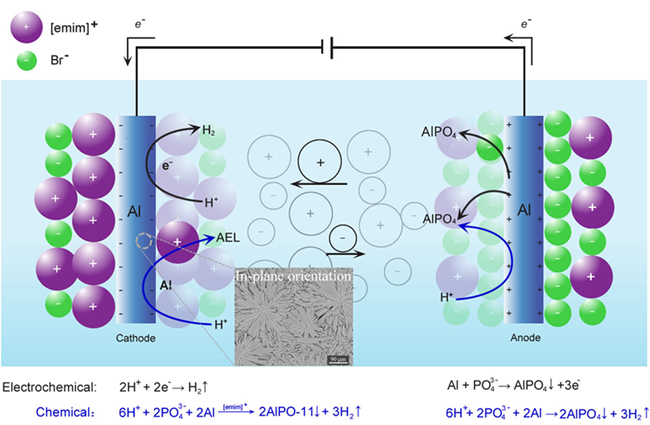Recently, Prof. Weishen Yang’s group made a progress in the synthesis of molecular-sieve films. Using self-developed electrochemical ionothermal method, an in-plane oriented and defect-free AlPO4-11 molecular-sieve film with excellent corrosion-resistant performance was in situ obtained. This work is now online published in the Journal of Angewandte Chemie International Edition (http://onlinelibrary.wiley.com/doi/10.1002/anie.201506183/abstract).
Molecular-sieve films have been widely explored as separation membranes, membrane reactors and functional coatings. These diverse applications primarily require to features, such as preferred orientations and being free of defects. How to simply prepare oriented and defect-free films remains a great challenge for the implementation and industrialization of molecular-sieve films technologies. Although a simple in situ crystallization method is favored for large-scale growth of molecular-sieve films, the random orientation and defects significantly limit performance of the films produced. Seeded growth often needs hierarch control of substrate modification and microstructural optimization to form seeds monolayer prior to oriented and defect-free film growth. However, the multi-steps limit its industrial applications.
Herein, we report a one-step in situ electrochemical ionothermal method that combines a controllable electric field with ionic liquids that have negligible vapor pressure, high ionic conductivity and wide electrochemical windows. The Al plane was both used as the electrode and the substrate, we then applied the external electric field to active the substrate surface, accelerating the interface reaction between the substrate and H3PO4 to provide the Al source. Furthermore, the negatively charged substrate can electrically adsorb the cations of ionic liquids that act as the structure-directing agents of AlPO4-11 molecular-sieve film. The two together produce a highly in-plane oriented AlPO4-11 molecular-sieve film in an open-vessel. It should be noted that the entire substrate surface could be completely converted to AlPO4-11 because positively charged protons and [emim]+ cations could readily reach any bare place on the surface under electric field and enable AlPO4-11 formation. Thus, the electrochemical mechanism promotes free defects of the film that was confirmed by DC polarization tests. And the tests also indicated the in-plane oriented film has an excellent corrosion-resistant performance. This simple, controllable method may scale-up easily in the future.
This work was financially supported by the 100-Talent project of Chinese Academy of Sciences and National Natural Science Foundation of China. (Text/Photo by Tongwen Yu and Prof. Wenling Chu )

New Research Progress in Molecular-Sieve Films